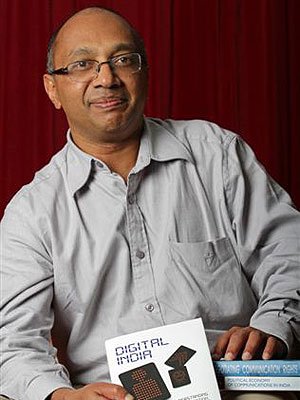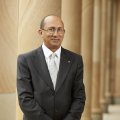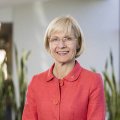
The University of Queensland lecturer Associate Professor Pradip Thomas was named Vice President of The International Association for Media and Communication Research (IAMCR) at a conference in Durban early this month.
A/P Thomas is co-director of the Centre for Communication and Social Change within the School of Journalism and Communication.
His IAMCR role involves overseeing publications and journals for one of the leading professional associations for media and communication academics in the world.
Dr Thomas hopes to continue the work of the IAMCR in facilitating open, collegial and provocative discussions on ideas that can make a difference.
“I want to ensure that IAMCR continues to support the pursuit of academic excellence and remain an organisation that pushes the boundaries on critical issues in the media and communication,” Dr Thomas said.
The IAMCR is one of the most important apex bodies bringing together committed, critical media scholars and public intellectuals to discuss issues such as Global Media Policy and Regulation.
While individual members are involved in media advocacy on a day-to-day basis, Dr Thomas says the IAMCR biennial conference is the association’s most important collective activity.
“The IAMCR conference acts as a sounding board for new ideas, new theories, new perspectives on the media and society and is a great place to network,” he said.
As well as his IAMCR appointment, Dr Thomas has just completed the third book in a trilogy on the media in India, published by Sage.
Digital India: Information, Communication & Social Change completes a trilogy series which critically explores media, information and communication in India from a political economy perspective.
The previous two volumes in the series are Political Economy of Communication in India: the Good, the Bad and the Ugly (2010) and Negotiating Communication Rights: Case Studies from India (2011).
“The story of the digital in India is not just about the software industry, IT and Business Process Outsourcing. It is also about how ordinary people who are not part of the digital revolution access the digital through un-official means – such as piracy and thus stake their claims,” he said.
Dr Thomas says Digital India offers media students an introduction to the relationship between the media and society and reveals how politics, economics and power shape media futures.
While he feels like a well deserved fishing break after four busy years with this trilogy, Dr Thomas is currently working on journal articles and planning a major symposium for early 2013.
Media: UQ Centre for Communication and Social Change communication and logistics officer Rhian Deutrom +61 7 3346 3465 or +61 448 783 100 or r.deutrom@uq.edu.au

.jpg?itok=A3VEKM1Y)









